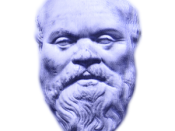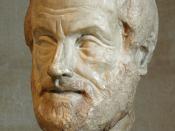Aristotle believed that all people by nature desire to know. A sign of one who knows is that that person can teach, while the person of experience without knowledge cannot. He defined wisdom as knowledge of principles and causes. In his Physics and Metaphysics Aristotle discussed the material and formal causes Plato used and also the efficient and final
causes. The material cause explains what something is made of (out of which), the formal cause how it is made (into which), the efficient cause who made it (by which), and the final cause why it is made (for which purpose). For Aristotle the final cause or purpose of anything analyzes the metaphysical cause which is studied in teleology. Aristotle also perceived God in the beginning as well as the end as the prime mover and in the present as completely actual in contrast to the concept of potential. Aristotle also gave many lectures on the sciences of astronomy, meteorology, and biology.
Aristotle analyzed the faculties of the soul as nutritive, perceptive, and intelligent, and he also discussed memory, sleep, dreams, and aging. At the Lyceum 158 Greek constitutions were gathered, and Aristotle's work On the Athenian Constitution has been useful in understanding the history of Athenian politics.
Although Aristotle agreed with his teacher Plato that poetry and drama are imitations, he disagreed in finding redeeming value for these arts and did not wish to censor or ban them. In his Poetics he noted that tragedy tends to portray those who are better and comedy those worse than people of the present day. Humans are the most imitative animal, delight in imitating, and learn much this way. Aristotle believed that learning is the greatest pleasure and is not just for philosophers but for all humanity. Thus the imitative arts are not...



Aristotle
You've submitted a good biography of one of the preeminent thinkers of all time, focusing on his beliefs. Like his predecessors, Socrates and Plato, Aristotle did much to advance what was in ancient Greece the burgeoning field of philosophy. Aristotle's teachings are somewhat abstruse but you have done well by making them more accessible. Your report was informative and interesting. Thumbs up!
5 out of 5 people found this comment useful.